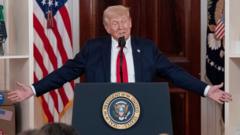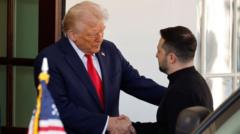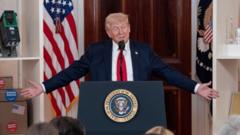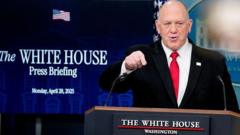President Trump’s foreign policy approach in his second term has been characterized by unpredictability and a focus on transactional relationships, as seen in a recent minerals deal with Ukraine. This marks a significant departure from traditional diplomatic practices, causing ripples in both alliances and rivalries.
Trump’s Second Term: A Chaotic Foreign Policy Shift

Trump’s Second Term: A Chaotic Foreign Policy Shift
As President Trump enters his second term, his transactional and unpredictable foreign policy is reshaping America's global role, raising concerns among allies.
As President Donald J. Trump embarks on his second term, his foreign policy has taken on an increasingly transactional and unpredictable character that has left both allies and adversaries recalibrating their approaches. This style was encapsulated in a recent incident in Munich, where an aide to Vice President JD Vance attempted to persuade a senior Ukrainian official to finalize a deal regarding the extraction of valuable minerals in Ukraine at an ungodly hour. Despite the late-night urgency, the proposal lingered unsigned until a later agreement was reached, highlighting a sense of exploitation in American statecraft during Trump's initial 100 days.
These early actions symbolize a broader shift in American foreign diplomacy, as Trump’s administration appears to wield a wrecking ball against long-standing international agreements and alliances. Key institutions, including NATO and the global trading system, have been thrust into uncertainty by the administration's overtly imperialistic demands.
Reactions from global competitors, notably China, underscore the ramifications of Trump’s new approach. Following substantial levies imposed by the U.S., China remains firm, confident in its dominance over various supply chains. European officials express alarm at the prospect of the United States possibly withdrawing tens of thousands of troops from the continent, a move that could further destabilize the geopolitical landscape.
In this period of turmoil, Trump’s foreign policy philosophy increasingly reflects a shift away from collaboration towards self-serving negotiations, making it imperative for allies to adapt quickly in order to navigate the new landscape shaped by a leader known for his unpredictable decision-making.






















